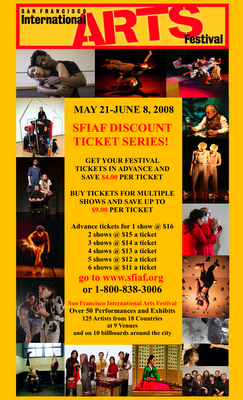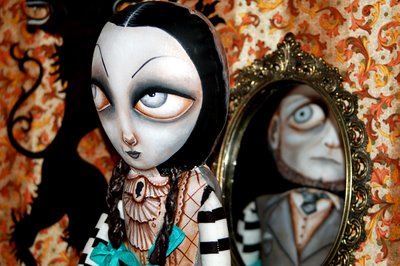 Duncan and I were on the Mission bus for Father's day listening to Guillermo Gomez-Pena comment on the vanilla hetero hipsters that displaced all the lesbians on Valencia street during the dot-com boomlet whilst Violeta Luna explicatively mimed the important points of his disquisition, the highest point being when she ascended the treads of the stairs to Mission Dolores on her knees, concomitantly scourging her back with a bouquet of roses. But his use of the word 'vanilla' reminded me of a story which I shall relate presently. This story tells of a time when Leslie Isaac accompanied me to one of the early Pink parties put on by the Mission Control people where we sat, untouched, observing the natives in their natural habitat. One of these locals, let's call him Mr A___, was sitting a few feet from us on the couch mounted by his wife in the reverse cowgirl position, her face planted in the uncovered and copious bosom of the host, wholeheartedly thrusting herself in a simple and straightforward but somehow agreeable rhythm. A few items of context: (1) I had just been on TV with Mr A___ taking about an upcoming performance and was intrigued to see him in this quite different scene, and (2) given the attractive and youthfully exuberant nature of the exhibition, the triad in question was subject to the gaze of about 10 other people all sitting quietly but intently about the room. After a few minutes of watching with the others, Leslie sighed quite loudly and whispered "this is so vanilla." Yes, dear Scarlett, we is powerfully jaded down here in the deepest darkest and most southerly parts of Frisco.
Duncan and I were on the Mission bus for Father's day listening to Guillermo Gomez-Pena comment on the vanilla hetero hipsters that displaced all the lesbians on Valencia street during the dot-com boomlet whilst Violeta Luna explicatively mimed the important points of his disquisition, the highest point being when she ascended the treads of the stairs to Mission Dolores on her knees, concomitantly scourging her back with a bouquet of roses. But his use of the word 'vanilla' reminded me of a story which I shall relate presently. This story tells of a time when Leslie Isaac accompanied me to one of the early Pink parties put on by the Mission Control people where we sat, untouched, observing the natives in their natural habitat. One of these locals, let's call him Mr A___, was sitting a few feet from us on the couch mounted by his wife in the reverse cowgirl position, her face planted in the uncovered and copious bosom of the host, wholeheartedly thrusting herself in a simple and straightforward but somehow agreeable rhythm. A few items of context: (1) I had just been on TV with Mr A___ taking about an upcoming performance and was intrigued to see him in this quite different scene, and (2) given the attractive and youthfully exuberant nature of the exhibition, the triad in question was subject to the gaze of about 10 other people all sitting quietly but intently about the room. After a few minutes of watching with the others, Leslie sighed quite loudly and whispered "this is so vanilla." Yes, dear Scarlett, we is powerfully jaded down here in the deepest darkest and most southerly parts of Frisco.
Saturday, June 21, 2008
Vanilla
 Duncan and I were on the Mission bus for Father's day listening to Guillermo Gomez-Pena comment on the vanilla hetero hipsters that displaced all the lesbians on Valencia street during the dot-com boomlet whilst Violeta Luna explicatively mimed the important points of his disquisition, the highest point being when she ascended the treads of the stairs to Mission Dolores on her knees, concomitantly scourging her back with a bouquet of roses. But his use of the word 'vanilla' reminded me of a story which I shall relate presently. This story tells of a time when Leslie Isaac accompanied me to one of the early Pink parties put on by the Mission Control people where we sat, untouched, observing the natives in their natural habitat. One of these locals, let's call him Mr A___, was sitting a few feet from us on the couch mounted by his wife in the reverse cowgirl position, her face planted in the uncovered and copious bosom of the host, wholeheartedly thrusting herself in a simple and straightforward but somehow agreeable rhythm. A few items of context: (1) I had just been on TV with Mr A___ taking about an upcoming performance and was intrigued to see him in this quite different scene, and (2) given the attractive and youthfully exuberant nature of the exhibition, the triad in question was subject to the gaze of about 10 other people all sitting quietly but intently about the room. After a few minutes of watching with the others, Leslie sighed quite loudly and whispered "this is so vanilla." Yes, dear Scarlett, we is powerfully jaded down here in the deepest darkest and most southerly parts of Frisco.
Duncan and I were on the Mission bus for Father's day listening to Guillermo Gomez-Pena comment on the vanilla hetero hipsters that displaced all the lesbians on Valencia street during the dot-com boomlet whilst Violeta Luna explicatively mimed the important points of his disquisition, the highest point being when she ascended the treads of the stairs to Mission Dolores on her knees, concomitantly scourging her back with a bouquet of roses. But his use of the word 'vanilla' reminded me of a story which I shall relate presently. This story tells of a time when Leslie Isaac accompanied me to one of the early Pink parties put on by the Mission Control people where we sat, untouched, observing the natives in their natural habitat. One of these locals, let's call him Mr A___, was sitting a few feet from us on the couch mounted by his wife in the reverse cowgirl position, her face planted in the uncovered and copious bosom of the host, wholeheartedly thrusting herself in a simple and straightforward but somehow agreeable rhythm. A few items of context: (1) I had just been on TV with Mr A___ taking about an upcoming performance and was intrigued to see him in this quite different scene, and (2) given the attractive and youthfully exuberant nature of the exhibition, the triad in question was subject to the gaze of about 10 other people all sitting quietly but intently about the room. After a few minutes of watching with the others, Leslie sighed quite loudly and whispered "this is so vanilla." Yes, dear Scarlett, we is powerfully jaded down here in the deepest darkest and most southerly parts of Frisco.
Thursday, June 12, 2008
On the Death of David Blakely
Tuesday, June 3, 2008
One more week
Saturday, May 24, 2008
The Trappings of Conventionality
 I received a reminder in the intertubish-mail of the weirdness of the Classical Music World. A benefit for Dawn Upshaw, which is fine and dandy, as she has been a great supporter of new works, but the oddnesses are legion, the most noticeable being (1) the incredibly long list of famous people on the benefit committee, which I'm sure holds court every Tuesday afternoon at the local Round Table Pizza just after the SCA get-togethers to argue for hours about who sits where and by whom and the gauge of the needles used to knit the tablecloths and whether they will have those disposable cameras at every table for the candid tit-flashing shots of the guests as the drinking progresses, (2) The priciness of the tix [Ed: of course] and (3) the small font tag under "Click image to respond." to the effect of, and I quote: "Business Attire. " Enough said!? Well, actually not enough at all. Let us please remember fondly a few Tom Wolfe quotes, from The Painted Word, which my wife and I read to each other in the car one long drive from LA to SF while lost in the fog.
I received a reminder in the intertubish-mail of the weirdness of the Classical Music World. A benefit for Dawn Upshaw, which is fine and dandy, as she has been a great supporter of new works, but the oddnesses are legion, the most noticeable being (1) the incredibly long list of famous people on the benefit committee, which I'm sure holds court every Tuesday afternoon at the local Round Table Pizza just after the SCA get-togethers to argue for hours about who sits where and by whom and the gauge of the needles used to knit the tablecloths and whether they will have those disposable cameras at every table for the candid tit-flashing shots of the guests as the drinking progresses, (2) The priciness of the tix [Ed: of course] and (3) the small font tag under "Click image to respond." to the effect of, and I quote: "Business Attire. " Enough said!? Well, actually not enough at all. Let us please remember fondly a few Tom Wolfe quotes, from The Painted Word, which my wife and I read to each other in the car one long drive from LA to SF while lost in the fog."...the [art mating] ritual has two phases: (1) The Boho Dance, in which the artist shows his stuff within the circles, coteries, movements, isms, of the home neighborhood, bohemia itself, as if he doesn't care about anything else; as if, in fact, he has a knife in his teeth against the fashionable world uptown. (2) The Consummation, in which culterati from that very same world, le monde, scout the various new movements and new artists of bohemia, select those who seem the most exciting, original, important, by whatever standards -- and shower them with all the rewards of celebrity."
"...here we have the classic demonstration of the artist who knows how to double-track his way from the Boho Dance to the Consummation as opposed to the artist who gets stuck forever in the Boho Dance. This is an ever-present hazard of the art mating ritual. Truly successful double-tracking requires the artist to be a sincere and committed performer in both roles. Many artists become so dedicated to bohemian values, internalize their antibourgeois feelings so profoundly, that they are unable to cut loose, let go ... and submit gracefully to good fortune; the sort of artist, and his name is Legion, who always comes to the black-tie openings at the Museum of Modern Art wearing a dinner jacket and paint-spattered Levis's . . . I'm still a virgin!"
Right. My paint-spattered Levi's are the corset and the frock coat and the riding crop and the bunny tail and other unwelcome non-business-attired choices couture.
When Sub Pontio Pilato had its West Coast Premiere, I wrote a bio for the program that started with the phrase "Erling Wold has been called a pathological liar and a bisexual sex addict..." After one of the performances, I oversaw and overheard a colleague point to the bio in the program and whisper to another colleague, "Well, he's not ready for prime time."
Now that I've reach my Grand Old Age I believe I am free to pontificate on all topics and so will drop this small pearl of wisdom: Make gol-durn sure that you always dress and speak and be the person you are and that you want to be or you will find in short order that you have gotten on the wrong train and you can't get off, that you will have to dress in business attire and hang about with people hardly like yourself and then your life will be over and will not have been lived but you will have a nice long list of achievements which can be repeated in the long loop on your video-enhanced tombstone until the servers are unplugged, the water shorts out the cables, and the acid rain washes away the last carved crying angel and all the rest.
Friday, May 23, 2008
Unsolicited testimony
Friday, May 16, 2008
Freeloading gigolo
 I'm quite smug and pleased with myself as seen above in Noah Berger's shot for the Chronicle. I am imagining myself as Erling and also seemingly as a person who has a rod jammed deep into his bowels. Joshua Kosman has written a lovely feature on me and the opera and I am allowing myself a bit of vain rodomantade and narcissism. In fact, I am going to go outside into my backyard right now and lean over the pond where the Gambusia are leaping through clouds of mosquitos and just stare at my own reflection, possibly falling in love with it and, unlike the love featured in my typical but-I-just-have-so-much-love-to-give story, this love will be a love that excludes all others. In this quiet beautiful space I can't hear Lynne's remonstrations as to how it's her house in Potrero Hill and her Garden and her etc and how I am just a freeloading gigolo and so on and so forth.
I'm quite smug and pleased with myself as seen above in Noah Berger's shot for the Chronicle. I am imagining myself as Erling and also seemingly as a person who has a rod jammed deep into his bowels. Joshua Kosman has written a lovely feature on me and the opera and I am allowing myself a bit of vain rodomantade and narcissism. In fact, I am going to go outside into my backyard right now and lean over the pond where the Gambusia are leaping through clouds of mosquitos and just stare at my own reflection, possibly falling in love with it and, unlike the love featured in my typical but-I-just-have-so-much-love-to-give story, this love will be a love that excludes all others. In this quiet beautiful space I can't hear Lynne's remonstrations as to how it's her house in Potrero Hill and her Garden and her etc and how I am just a freeloading gigolo and so on and so forth.
Thursday, May 15, 2008
Pirate Cat Tonight
 Once again on Bunnywhisker's show on Pirate Cat Radio. John was supposed to come with me to plug the opera, and I pestered him about it, feeding him prawns from my own hand and soaking his gut with alcohol to get him in the mood, but unfortunately this caused in him the opposite reaction, and he crashed bad, limping back to his hovel to sleep off the long hours of rehearsal day after day. The show has been fun as usual, broadcast booth filled with interesting people, like the stage at a house music concert, or maybe more aptly like the gaggle of oddballs in the Howard Stern studio.
Once again on Bunnywhisker's show on Pirate Cat Radio. John was supposed to come with me to plug the opera, and I pestered him about it, feeding him prawns from my own hand and soaking his gut with alcohol to get him in the mood, but unfortunately this caused in him the opposite reaction, and he crashed bad, limping back to his hovel to sleep off the long hours of rehearsal day after day. The show has been fun as usual, broadcast booth filled with interesting people, like the stage at a house music concert, or maybe more aptly like the gaggle of oddballs in the Howard Stern studio. Wednesday, May 14, 2008
Slow slow and slower

My friend George Zelenz, who once informed me that he seriously considered ending our friendship after I gave up on the true way of Just Intonation, wrote this after Lou Harrison's death a while back. I remembered it as I needed to take this path myself.
Driving around, we talked about all the usual stuff we always talked about. Pretty much everything except music. We rarely talked about music. About an hour into the drive, he did ask me how my composing went. I told him about this dancer I was writing for up in Berkeley. It paid very little, but I was doing my best I said. I told him about the structure being mostly whole notes, sung quietly, in a 3 voice part. He said, "I have a poorly compensated commission of my own right now, I think I as well will just write a lot of whole notes."
Monday, May 12, 2008
How I am perceived by the Slovak press
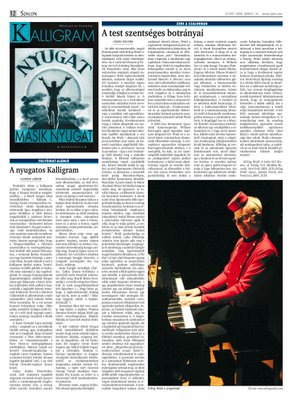
My boy
Saturday, May 10, 2008
Two faces turned away from each other

Friday, May 2, 2008
The Sousa Variations
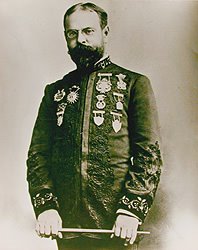 The SFCCO commissioned a number of us to write a set of variations on Stars and Stripes Forever, the one that goes as follows (yes, I get them all confused, the tapestry of Sousa marches, each cut from the same cloth, but what a fine cloth it is, akin to the cloth of the Strauss waltzes, so please sing along): be kind to your web footed friends etc. It was due last week but I am late, very very late, but I do have the program notes done, which I suppose is something, so here they are:
The SFCCO commissioned a number of us to write a set of variations on Stars and Stripes Forever, the one that goes as follows (yes, I get them all confused, the tapestry of Sousa marches, each cut from the same cloth, but what a fine cloth it is, akin to the cloth of the Strauss waltzes, so please sing along): be kind to your web footed friends etc. It was due last week but I am late, very very late, but I do have the program notes done, which I suppose is something, so here they are:Loss of my virginity
Thursday, May 1, 2008
Name in Print
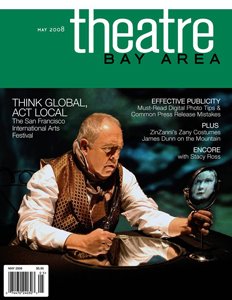 Theatre Bay Area Magazine is featuring Mordake on the cover as part of an article about the SF International Arts Festival. The article quotes me quite a lot, even going so far as to extemporize a bit beyond what I may have actually said. But what the hey.
Theatre Bay Area Magazine is featuring Mordake on the cover as part of an article about the SF International Arts Festival. The article quotes me quite a lot, even going so far as to extemporize a bit beyond what I may have actually said. But what the hey. Wednesday, April 30, 2008
Dying in the Saddle
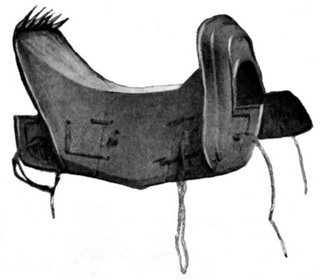 from the wikipedia article on Louis Vierne:
from the wikipedia article on Louis Vierne:Monday, April 28, 2008
Sunday, April 27, 2008
Mordake Visuals, Construction, Music et al
 I was informed by electronic post late last night that Lynne has been blogging her work for Mordake. As of yesterday morning I finally finished setting the last of Douglas's text, almost just barely too late as we really are in the middle of rehearsals, and Herr Weiß is here only for another week or so, and M. Duykers is back in Florida performing final excruciations on his students. Several would-be assistants had other projects interfere with their participation, but luckily our friend Diana showed up direct from Amersfoort NL, firmly gripped the handle of our construction problems, caused the Jack in the Box to pop out, and has left us all deeply satisfied with her work.
I was informed by electronic post late last night that Lynne has been blogging her work for Mordake. As of yesterday morning I finally finished setting the last of Douglas's text, almost just barely too late as we really are in the middle of rehearsals, and Herr Weiß is here only for another week or so, and M. Duykers is back in Florida performing final excruciations on his students. Several would-be assistants had other projects interfere with their participation, but luckily our friend Diana showed up direct from Amersfoort NL, firmly gripped the handle of our construction problems, caused the Jack in the Box to pop out, and has left us all deeply satisfied with her work. Tune of the day
Thursday, April 17, 2008
3½/4
 As a milksop, I've been reticent to specify the true nature of some rhythms I use commonly, so I'd like to say here for those of you listening that when the pulse is basically quarters (say) and I write a time signature of 7/8 (say), what I really mean is 3½/4 or 3/4 + 1/8 or 3.5/4. I've tried to explain this to a number of conductors in the past but they've scowled at me and tossed their hair and brushed me aside and explained that this is simply not possible, that they can't have a dangling ½ a beat andthen proceed to conduct it as 2 2 3, which really is not the same, now is it? I mean, it's *really* goddang not the same! So why do I allow it? Well, see the definition of namby-pamby in your well-thumbed English-English dictionary.
As a milksop, I've been reticent to specify the true nature of some rhythms I use commonly, so I'd like to say here for those of you listening that when the pulse is basically quarters (say) and I write a time signature of 7/8 (say), what I really mean is 3½/4 or 3/4 + 1/8 or 3.5/4. I've tried to explain this to a number of conductors in the past but they've scowled at me and tossed their hair and brushed me aside and explained that this is simply not possible, that they can't have a dangling ½ a beat andthen proceed to conduct it as 2 2 3, which really is not the same, now is it? I mean, it's *really* goddang not the same! So why do I allow it? Well, see the definition of namby-pamby in your well-thumbed English-English dictionary. Tuesday, April 15, 2008
Ode to the Shy Monk
 Review of the Missa came out today in the St. Gallen Tagblatt. Google's automatic translator produces this, which is a bit poetic, viz "Major outbreaks searches in vain." Listening to the recording from Sunday in the clear but jet-lagged light of day today, which I've put up here, I realize that they did do a beautiful job.
Review of the Missa came out today in the St. Gallen Tagblatt. Google's automatic translator produces this, which is a bit poetic, viz "Major outbreaks searches in vain." Listening to the recording from Sunday in the clear but jet-lagged light of day today, which I've put up here, I realize that they did do a beautiful job. Worlds in Collision

Sunday, April 13, 2008
Rhythms, Bells, St Gallus and the Bear

Friday, April 11, 2008
Wednesday, April 9, 2008
Lake Como
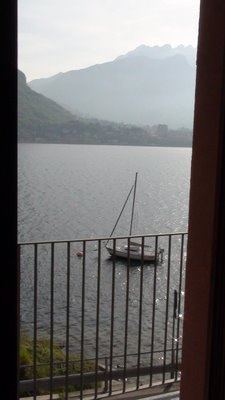 Looking over Lake Como from our room at the Bellavista in Valmedrera at the town of Lecco in the distance, where my filmmaker friend Ilaria lives. Lynne says the bell tower is typical Lombardy. Bellagio, the real one, is just north of here, famous in my circles for the Rockefeller study center. Ron Kuivila told us that his residency there consisted of one unbroken cocktail hour. The hoteliers speak Western Lombard, not sure which dialect.
Looking over Lake Como from our room at the Bellavista in Valmedrera at the town of Lecco in the distance, where my filmmaker friend Ilaria lives. Lynne says the bell tower is typical Lombardy. Bellagio, the real one, is just north of here, famous in my circles for the Rockefeller study center. Ron Kuivila told us that his residency there consisted of one unbroken cocktail hour. The hoteliers speak Western Lombard, not sure which dialect.Monday, April 7, 2008
Ruth's Kosher Vegetarian Restaurant

Friday, April 4, 2008
More devils than birds in the sky
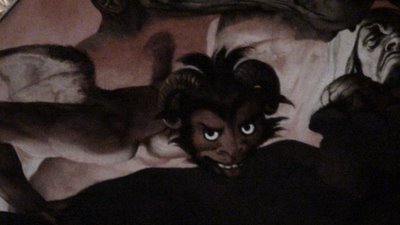 A great number of demons in the Vatican, some quite voluptuous, some rakish, some horrific, but all kinda appealing. While we all hope for an eternity spent in quiet contemplation of the Celestial Visage, the fires of Hell and the activities of its residents make a far more winsome subject for the visual arts.
A great number of demons in the Vatican, some quite voluptuous, some rakish, some horrific, but all kinda appealing. While we all hope for an eternity spent in quiet contemplation of the Celestial Visage, the fires of Hell and the activities of its residents make a far more winsome subject for the visual arts. Luigi Dallapiccola
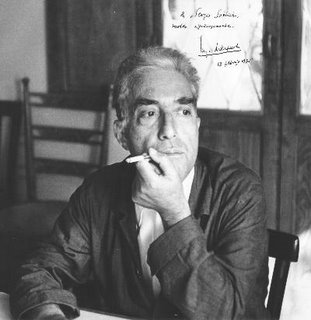 My son said yesterday that it would be expedient for me career-wise to spend a bit of time in prison, especially for a political crime. Maybe that's more likely currently, here in the land of Mussolini and Berlusconi than back in the sun soaked bliss of whatever San Francisco. In Roma my thoughts have turned to the various Italians I have known and loved: Nono and Berio and Dallapiccola. The budding latter young Luigi did spend some career enhancing time with his family in a camp for subversives in Graz, the hometown of our own favorite California National Socialist and Führer, but the connection today is a mention of myself in a discussion here on whether Dallapiccola may have wanted to have his music played in JI or some other non-equal tuning system. I felt compelled to correct a small error. A statement on the Minnesota Multiphasic Personality Inventory: I often need to correct others' mistakes, answer yes. JI and tuning history in general is still so misunderstood, and the recentness of the God-given nature of 12 equal so little known, that I do feel I need to say something from time to time just to rail against the darkness etc. Once again I feel the need to retune my life and music a bit.
My son said yesterday that it would be expedient for me career-wise to spend a bit of time in prison, especially for a political crime. Maybe that's more likely currently, here in the land of Mussolini and Berlusconi than back in the sun soaked bliss of whatever San Francisco. In Roma my thoughts have turned to the various Italians I have known and loved: Nono and Berio and Dallapiccola. The budding latter young Luigi did spend some career enhancing time with his family in a camp for subversives in Graz, the hometown of our own favorite California National Socialist and Führer, but the connection today is a mention of myself in a discussion here on whether Dallapiccola may have wanted to have his music played in JI or some other non-equal tuning system. I felt compelled to correct a small error. A statement on the Minnesota Multiphasic Personality Inventory: I often need to correct others' mistakes, answer yes. JI and tuning history in general is still so misunderstood, and the recentness of the God-given nature of 12 equal so little known, that I do feel I need to say something from time to time just to rail against the darkness etc. Once again I feel the need to retune my life and music a bit.
Sunday, March 30, 2008
Desire Line

Tuesday, March 18, 2008
When and Where

Sunday, March 9, 2008
Poultice o' my heart
Monday, March 3, 2008
Meditation on Jon

Composing music is a strange ephemeral artform, constructing something from the almost nothingness of sound, pressure-wave vibrations of the air. But this strange ephemera is somehow able to touch deep inside the listener, bringing up emotions and reactions pleasant and unpleasant but impossible to ignore. In the films of the Hollywood mainstream, the emotional power of music and its ability to pass by the viewer's defenses is often used to manipulate, to subliminally broadcast to the listener how they are supposed to feel. But music in Jon's films is different. Although it carries a large part of the emotional weight of his films, it is not a hidden wedge into the viewer's heart. In fact, it is usually banished from those scenes which are the most directly narrative and kept to those long minimal moments of repose that are so dear to Jon. It is given an equal billing, with narrative, with the landscape, with the characters, part of a set of parallel threads that each relate to the viewer a different aspect of the story.
I first met Jon at a screening of All the Vermeers in New York at the Pacific Film Archive in Berkeley California. The producer, Henry Rosenthal, whom I had known through the Just Intonation Network years before, called me and told me I had to come, that it had been a labor of love and that he was quite proud of it. When I saw it, I was enraptured. I loved the look of it, the pace of it, the feel of it, and especially the music by Jon English. It was such a musical film, both indirectly, with a feel for rhythms on the short and long and architectural scale and directly, leaving space for musical development that Jon English filled so beautifully, especially in the long tracking shot dancing among the columns of the lobby of some Wall Street location.
A few years later, as Jon Jost's Sure Fire needed to be finished for its debut at Sundance, Henry called me while I was staying in a room in a businessman's hotel in Japan that was the size of a smallish shoebox and told me that Jon English was too ill to finish the music, in fact that he had written only a short melody for pedal steel; that the music had to be done in a couple of weeks; that it needed to be in a country style and that it also had to be in just intonation. I jumped at the opportunity. When I returned from Japan, I got a videotape of the film in its almost-finished state and wrote the music very quickly, sketching out a primarily synthesized score, starting from the melody that Jon English had written, and bringing in his pedal steel player to improvise with me. There were some brief meetings with Henry and Jon Jost, where they pointed at large problematic sections and told me to fix them, but mainly I was left alone to do what I wanted inside the constraints of no budget and no time. Jon did tell me there were some important numerological features of the film centering around the number 13, which I worked into various rhythms and various pitch ratios.
As Sure Fire was completed and as Jon and I spent more time together, we had an opportunity to work in a more relaxed fashion. He started to tell me of his plans for the next film, The Bed You Sleep In. Jon had written bits of a script and said that he wanted some music done before production so that he could play it for the actors while they were working. He also told me one of his recurring ideas, that he had always wanted music that naturally came from the location sound, sometimes imperceptibly. But he also wanted real music, not just sound, and I suggested a mixture of classical and folk and electronic instruments, and a mix of classical and popular styles.
From the notes to the CD:
During the production of the film, John Murphy, who was doing the location recording, took me into the sawmill featured in the film. Walking through the mill was like listening to a great industrial/futurist composition, the sound wonderfully dense and richly spatialized. The sounds and smells of the local mills, especially the Georgia Pacific plant, were present throughout the town of Toledo. The sound of the GP plant was audible in all the location recordings, whether inside or out. The plant sat at the side of a tremendous chemical lake, a dirty brown pool with fountains spraying noxious liquid in large plumes up from the surface. Its presence so overwhelmed me that, at one point, I had decided to do all the music using the sounds of the mill and the GP plant. In the end, I used a variety of sound sources. Some of the music, notably that which frames the letter scene, is generated almost entirely from sampled and processed recordings of the mill made by John Murphy during the production. Some of these samples are used as instruments in other pieces and are mixed with the acoustic instrumental ensemble. [...]
After the production, Jon and Mark Redpath started editing and I began to see the film that didn't exist in the screenplay. There were many long, static shots where Jon wanted the music to firmly imprint the film's bleak emotional state. There was an extensive use of split screens. There were a number of musical dichotomies I intended to be analogues of this, but the most successful [were in two scenes]. The first was a spare statement, where a single tone split into two diverging tones. In the second, where the screen collapses in on itself, a similar divergence occurred in a rich instrumental texture, causing the harmonies to quaver and shift in a continuous manner.
I went with Jon and Henry to the premiere of The Bed You Sleep In at the Berlin film festival where, unfortunately, Jon and Henry had a falling out over disagreements about control and ownership of the films they had done together. By the time Frame Up was completed, for which Jon English wrote the music and I did some sound work, the two of them were completely separated. But, in late 1994, Jon asked me to come to Vienna to begin work on Albrechts Flügel, a film about a second violinist in the Wiener Symphoniker, a person who, like so many of us, comes close to greatness, almost achieving it, but who is painfully aware that they will never succeed. It is so sad to me that this movie never came to fruition. The music was to have been an integral part of the film, part of the narrative and a lens through which the characters saw the world. Jon and I talked many times about the music and the ideas in the film. I worked with one of the actors, an amateur violinist, and I started to work on some music, including what became the Albrechts Flügel suite of piano pieces. This, I thought, would be the next step in our artistic relationship, a close partnership from the beginning of the film, hinted at in Bed, but taken even further. But the film fell apart when Jon discovered some irregularities in the handling of the financing for the film. I was never clear exactly what happened, but he left Austria and settled in Rome, where he finished Uno a me, uno a te e uno a Raffaele.
Soon after, Jon turned away from narrative films, playing with the flexibility and affordability of cheap digital cinema, first with Nas Correntes de Luz da Ria Formosa, a beautiful meditation on a fishing village in Portugal, and later London Brief. I worked with Jon on the latter film, but only from a distance. I wrote a number of pieces, all electronic works, based on what I saw in his early drafts. I gave him a free hand in using those excerpts, placing them where he wanted, cutting and adjusting them. I know he liked the intimacy and control of the new medium, that he could sit and work and recut and change everything at his computer by himself without having to worry about cutting room rental costs, sound engineers, and so on. I think, in his heart, Jon wishes he could do it all himself. He wrote the music for some of his early films and has a strong musical sensibility and, finally, is a person with a strong overall vision.
Since that time, I have contributed music for a couple of his films after his return to narrative filmmaking: Homecoming and La Lunga Ombra. I'm sure that, sooner or later and his recent cancer scare notwithstanding, I'll do more. But because of our separation - Jon is in Korea these days - and the lack of money available for Jon's work and therefore for my time, there hasn't been quite the same level of connection as when we did Bed and Sure Fire, when we used to play table tennis together (Jon and I are both very competitive) and talk in detail about the films and how the music should act in them. Maybe it can happen again. I hope it does.
photo by mica scalin
Sunday, March 2, 2008
Ilaria, director
Thursday, February 28, 2008
Mordake Suite Number Two
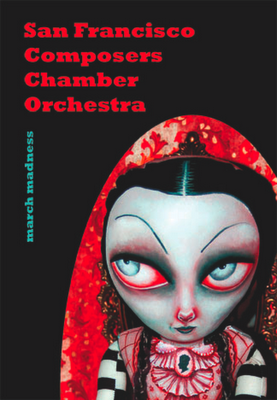 Dearest friends, folks and loved ones,
Dearest friends, folks and loved ones,I know you are waiting with bated breath, on the edge of your seat, knuckles white in anticipation for the curtains to rise, the lights to come up, the orchestra to begin, and the full throated roar of the singer to announce the premiere of the latest work from the pen of Der Wold but, please, hold, calm down, be patient; all your desires will be sated so very soon, but first, you must endure one more gol-durned Mordake pre-pre-preview concert. Once again, Mark Alburger takes up the baton and conducts the SFCCO in a suite from Mordake, although this time not the prettiest sections, but those parts most dark and most evil, a stain on the very heart of music itself, a stain that will not wash off no matter how much we scrub and scrub with the latest detergents, oxidizers and antimicrobial agents.
and Old First Concerts Present:
"MARCH MADNESS"
Saturday March 8, 2007 at 8 pm
Old First Concerts
1751 Sacramento Street/Van Ness, San Francisco, CA 94109
$15 General, $12 Seniors (65 and older), $12 Full Time Students
Tickets are available through the Old First Concerts Box Office at (415) 474-1608, online at oldfirstconcerts.org and at the door. For more information, please call
Old First Concerts box office or visit SFCCO at http://www.sfcco.org.
Lunacy. Spaciness. Taking 20 years to write a piece. Thinking that music will save the planet. Having a face in the back of one's head. Suicidal thoughts. Why do we do what we do? Because we can't do otherwise? One thing's for sure: it's a crazy world. So come celebrate the craziness with Alexis Alrich, Michael Cooke, Philip Freihofner, Dan Reiter, Martha Stoddard, Erling Wold, and the San Francisco Composers Chamber Orchestra as they present "March Madness"!
Michael Cooke's Sun & Moon is a dizzying take on time and place, with members of the orchestra performing spacilly and spatially at the point-and-click discretion of Music Director Mark Alburger. Martha Stoddard, as Guest Conductor, will take the ensemble even farther out in A Little Trip to Outer Space where reality has lost its bearings. The entire orchestra will evaporate in the clangor of metal as Philip Freihofner re-invents sanity in The Bell Field, while Dan Reiter's Toccata and Fugue will send minds reeling under the direction of Associate Conductor John Kendall Bailey toward a reckoning with Johann Sebastian Bach. Farthest afield on earth will be Alexis Alrich's Fragile Forests: II Cambodia, where East and West consciousnesses collide in the loveliest possible manner. And, as a final coup-de-grace Erling Wold will evoke the diabolical in Mordake Suite No. 2, in hint of his mad opera to be premiered later in the year.
Alexis Alrich Fragile Forests: II Cambodia
Michael Cooke Sun & Moon
Philip Freihofner The Bell Field
Lisa Prosek Chain Saw
Dan Reiter Toccata and Fugue
Martha Stoddard A Little Trip to Outer Space
Erling Wold Mordake Suite Number 2
Tuesday, February 26, 2008
Torture of the damned
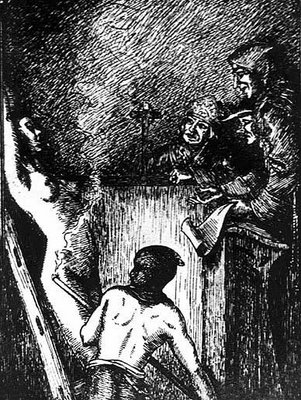
Saturday, February 23, 2008
Advice to young composers
if no one will review your music, don't complain; start your own journal
if no one will publish your music, don't complain; start your own publishing company
if no opera house will produce your music, don't complain; start your own opera house
if no one will fund your music, don't complain; fund your music yourself
if no one will publicize your music, don't complain; publicize your music yourself
if no one will buy your music, don't complain; buy your music yourself
if no one will listen to your music, don't complain; listen to your music yourself
Wednesday, February 6, 2008
Tune of the day
Monday, February 4, 2008
Death as happiness, death as sadness
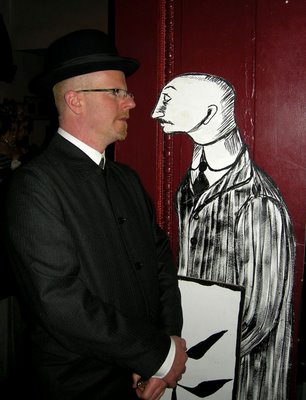 My friend and myself at the Edwardian ball in a photo taken by Lynne last weekend, similar in our stiff and wooden disposition. More here. The crowd was a bit gothic, although not as much as the Meat vs. Death Guild romp at DNA lounge a few weeks ago, celebrating death's warm embrace at least in choice of fashion and desaturated makeup.
My friend and myself at the Edwardian ball in a photo taken by Lynne last weekend, similar in our stiff and wooden disposition. More here. The crowd was a bit gothic, although not as much as the Meat vs. Death Guild romp at DNA lounge a few weeks ago, celebrating death's warm embrace at least in choice of fashion and desaturated makeup.But is Death is now a welcome guest? Heading off to hear Carla Kihlstedt play the premiere of Jorge Liderman's Furthermore... tonight on a somber note after his decision to place himself in front of an oncoming train yesterday. Although still "under investigation" it seems that he was sadder than his music. Hopefully he will now find some peace. My wife once told me that the fact that there was an exit available to her when she needed it kept her going through parts of her youth. I've thought about that many times over the years. Life is hard for all of us, but the life of a modern composer is that of a misfit, unloved and unwanted by most, if in fact 'most' even are aware that such an animal exists.
Monday, January 28, 2008
Tune of the day
Wednesday, January 23, 2008
Stockhausen my Stockhausen

Update: here's the show podcast. The show itself should reach Sirius in 8.6 ± 0.04 years.
Sunday, January 20, 2008
Once there was a boy
Saturday, January 19, 2008
Monday, January 14, 2008
Theological, phrenological, surgical
John Duykers performing I'm no murderer from Mordake at Intersection for the Arts, San Francisco, 10th of January 2008. Libretto by Douglas Kearney, directed by Melissa Weaver, production by matt:matt, costume by Kathleen Crowley, with some buzzy extra sounds from Thom Blum, filming by James Bisso, with a backdrop of an altered photo taken by Lynne of a bedroom of the Reutlinger House.
I wrote the gender changing software used at the end - a phase vocoder with formant shifting - for Korporate Marionettes. In this aria, Edvard Mordake tries to shuffle off responsibility for beating his man onto The Other, his shadow, his sister. The text setting in this opera is turning out to be a bit different for me, less driven by the prosody and with more common meters instead of the different-meter-on-every-bar or melodies floating in their own rhythmic world above more regular but still less common meters. Maybe this is because Douglas's words are more poetic and less prose-like than my usual texts. One unintended but happy result is that there is much less need for a conductor.
Saturday, January 12, 2008
akin to that of Antinous
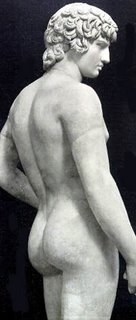 Since the diminution of the Jesuit educational system, we artists can no longer count on the average audience understanding many Western cultural references that used to be taken for granted: the Classical, Mythological, Biblical, Shakespearean former pillars of cultural literacy. However, our librettist, in his bull-headedness, has chosen to ignore this fact, to eschew the requisite references to pop song lyrics and celebrity couplings and instead to rely on some of those very allusions, those facts unavailable to all of us whose education consisted merely of smoking dope in the girl's restroom and leaving thumbtacks on the teacher's chair until that sad day when social promotions pushed us out into the real world, woefully unprepared for highbrow operas. So, to remedy that, I will give a brief rundown of one that appears in the abridgement of Mordake which we are about to witness.
Since the diminution of the Jesuit educational system, we artists can no longer count on the average audience understanding many Western cultural references that used to be taken for granted: the Classical, Mythological, Biblical, Shakespearean former pillars of cultural literacy. However, our librettist, in his bull-headedness, has chosen to ignore this fact, to eschew the requisite references to pop song lyrics and celebrity couplings and instead to rely on some of those very allusions, those facts unavailable to all of us whose education consisted merely of smoking dope in the girl's restroom and leaving thumbtacks on the teacher's chair until that sad day when social promotions pushed us out into the real world, woefully unprepared for highbrow operas. So, to remedy that, I will give a brief rundown of one that appears in the abridgement of Mordake which we are about to witness.In the introduction, in reference to Edward Mordake himself, we find that "his face was that of Antinous." We ask: who is this Antinous? I say to you that he was a beautiful boy who, around about age 11, become the lover of the Roman Emperor Hadrian, in the fashion of the day, following the Greek tradition of the eromenos, to wit, the idealized pederastic relationship between an adolescent boy and an adult man, both best friends forever and pure lovers, seen to be part of aristocratic moral and educational development, military training, and, of course, Intercrural Sex, which you can look up for yourself in any accurate biography of Honest Abe Lincoln. At around age 18, possibly in an attempt to save his beloved emperor, Antinous drowned in the Nile. Hadrian's grief was unbounded and, following in the footsteps of the great Alexander, had Antinous proclaimed a god. Worship was widespread throughout the empire. There were cities named after him, temples built for his worship, festivals in his honor, a constellation named after him (until the regularization of the constellations by the International Astronomical Union in the 1930s), and many
 many statues and coins and busts and gems bearing his likeness, all recording his famous pouting lips, considered his most distinctive feature.
many statues and coins and busts and gems bearing his likeness, all recording his famous pouting lips, considered his most distinctive feature.My favorite quote about Antinous (although unrelated to the story at hand) is this homophobic number from Gibbon's Decline and Fall of the Roman Empire:
The deification of Antinous, his medals, statues, city, oracles, and constellation, are well known, and still dishonor the memory of Hadrian. Yet we may remark, that of the first fifteen emperors, Claudius was the only one whose taste in love was entirely correct.
Friday, January 11, 2008
Mordake Appears
Saturday, January 5, 2008
Finally Stockhausen
Which, since we are starting on a wander, reminds me of my sophomoric and adolescent pseudo-intellectualism where, having been force-fed the Wittgensteinian bologna about the lack of meaning of a private language, I took my recently purchased but yet unlistened-to copy of Daphnis and Chloe and played it for months at 45 RPM so when I finally heard the piece played normal-like, I would have a true private experience. Yes?
But do we all know Stockhausen's origin myth? I happened to see the original quote from the master of Darmstadt on Anablog, and here 'tis:
"I think that the culture of this planet has been mainly formed by visitors from Sirius, especially in the time between 9000 and 6000 B.C...I think that our main sources of present-day culture, as decadent as it may be in most parts of the planet, stem from visitors from Sirius whose main representatives were Isis and Osiris. Through a series of revelations which were at first quite nebulous, but have become more clear during the past few years, I know (as little as I know about details) that I have come from Sirius, myself."
Tuesday, January 1, 2008
My New Year's Resolution
 is to survive from now till a week from Thursday: the Teaser showing of Mordake at the Intersection. It's a homecoming of sorts; I presented my very first chamber opera at the Intersection back in 1995. The Intersection is a beautiful intimate space and it's going to be great fun to put up a section of the piece there, also following the very important plan of getting everyone drunk enough beforehand to appreciate it all properly. But the survival issue comes from having a day job as well as a night job or maybe two lives in two parallel universes. Like Mordake, I can't seem to integrate both in healthy way. So far I've done it by stressing myself to the point of near death, working from morning until night on one and then from night to the week hours on the other, catching a bit of sleep and proceeding again.
is to survive from now till a week from Thursday: the Teaser showing of Mordake at the Intersection. It's a homecoming of sorts; I presented my very first chamber opera at the Intersection back in 1995. The Intersection is a beautiful intimate space and it's going to be great fun to put up a section of the piece there, also following the very important plan of getting everyone drunk enough beforehand to appreciate it all properly. But the survival issue comes from having a day job as well as a night job or maybe two lives in two parallel universes. Like Mordake, I can't seem to integrate both in healthy way. So far I've done it by stressing myself to the point of near death, working from morning until night on one and then from night to the week hours on the other, catching a bit of sleep and proceeding again.The piece seems to be getting darker as we go further in. Maybe it's finding the horror tale it always was, that in our delight at working together we lost sight. I am seduced by the sounds and the music and the look and feel of it all, but it's been pulling me apart as well to face my dark self, waking up in a sweat in the night, just as children tremble and fear all
in the viewless dark.
Saturday, December 22, 2007
One too many speedballs
 Duykers and I have been sneaking coke and aspirin out from under the watchful eye of Melissa, our dear director. She seems to think it a symptom of unhealthfulness, and doth not accept our need of it for our creativological inventionity. But I say more and more and more and to follow it up with shots of icy cold Belvedere, poured down my open throat by a young lesbian, hand on my throat, an unseen assailant yanking back my hair. But this is the way we artists must move our world forward, innit?
Duykers and I have been sneaking coke and aspirin out from under the watchful eye of Melissa, our dear director. She seems to think it a symptom of unhealthfulness, and doth not accept our need of it for our creativological inventionity. But I say more and more and more and to follow it up with shots of icy cold Belvedere, poured down my open throat by a young lesbian, hand on my throat, an unseen assailant yanking back my hair. But this is the way we artists must move our world forward, innit?The Mordake story has become more personal for me as we have proceeded. Mordake has a problem integrating a perceived feminine shadow-self; a typical Victorian who represses all his imperfections, his vices, sexuality, etc, and who wants his nature blocked off in neat gardens whose borders are at right angles. Is there a modern connection between us and him, that his faults come from this difference between who he really is and the image that he presents to the world? I know that I have struggled with integrating the so-called darker aspects of myself with those images carefully chosen, and as well integrating the masculine and feminine, qua engineer and artist (which is which is left as an exercise for the reader).
It's been great to see the piece come together. It's wonderful to hear Duykers sing it - so much better than hearing me sing it, even though I do like the sensation physique of the vibrations passing through my body, the Navier-Stokesian eddies forming about my glottis, like The Eternal Syllable of the Hindu. Matt Jones leaps up to satisfy each of our whims, cutting bits of paper dolls when we require it, tearing apart circuits and speakers, rigging floating gramophones and of course subversively continuing to prepare the way for our robot overlords.
Friday, December 21, 2007
Queer Filler

Fred Dodsworth: Why "Queer"?
Erling Wold: I loved this book when I read it 15 years ago. I just identified with the character. I identified with the unrequited love in it. I was really taken with the language and the feeling of it, the emotion of it.
Q: Tell me about the emotion.
A: It's an autobiographical novel. The character William Lee is
Burroughs, and he falls for this younger guy named Eugene Allerton who is... it's a little unclear what he is. He's either closeted or indifferent or a hustler or something. He responds to Lee but he doesn't... kind of... (Nervous chuckle.) He responds but not completely. Basically it's a sad, unrequited love story. This is probably the best description of that I've ever read, either in gay or straight or whatever literature. This is actually one of my favorite kinds of stories.
Q: Why?
A: I like that emotion, that feeling where you're really drawn to somebody and you just can't have them. (Nervous laughter.) I'm very attracted to that kind of story and that kind of feeling. It's a very
romantic story. In fact, Queer, the character, is a hopeless romantic. That's a big part of the way it's done. Lee sings. Allerton only speaks. It's very much Lee's story. The whole story is told from Lee's point of view. All the characters are only there in as much as they are a reflection of what Lee is feeling for that person at that moment. They're never presented in any kind of three-dimensional way. He's kind of a boorish guy in some ways. He's kind of racist. He's an ugly American in Mexico City...
Q: Isn't this when Burroughs "accidentally" killed his wife?
A: He killed his wife and then became a writer. Allen Ginsberg thinks she was committing suicide. They were playing William Tell with a shot glass. Who knows? They were both drunk. He was an excellent shot. It's unclear what was going on. Burroughs and his wife had a very interesting relationship. They were very close. They were like soulmates, but he was a pretty gay guy. This is a time when people didn't tend to identify themselves as being gay, but he does. He's very outspoken about it. He's very open about it and, in fact, he's angry with the world because it interferes with all the things that are important to him -- being gay, being a junkie. The world gets in the way of that.
Q: Gay? Married?
A: Early in his life he was a big ladies man. He also liked men from early on. At this time he's living in Mexico City with his wife but he's totally going after all the Mexican boys he sees, plus this Allerton
guy, and he has this little circle of queer friends that hang around in this ex-patriot [sic: expatriate] bar community. I don't know what that all means. Later in life he became a misogynist. He decided that women were evil.
Q: Do you assume any responsibility when you promote this work?
A: I don't know if I take responsibility for every single thing but I do like certain things about his worldview. They do connect with me. I understand this idea that the world is in your way... that there're a lot of people who disapprove of what you're doing. That's VERY annoying.
Q: What is the responsibility of an artist?
A: I've come to believe you do it as a philanthropic gesture to the world. You're not in it for yourself -- not doing the kind of thing that I do -- that's not commercial. The only kind of reason I can see that makes sense is that you're driven to do it, but also, hopefully, you're giving people some cultural experiences that will be important to them. I think there's a certain amount of social responsibility, but I think that just comes from yourself. You just do things that are true to what you believe, and that's as much as you do.
Q: Are you trying to teach social lessons?
A: I'm not -- except in the fact that the things I pick are what I believe in. "I believe in this, but you can take it or leave it." (Laughter.) I don't know that I'm trying to convince people. I know that if you "touch" people, you tend to convince them of something that you believe. I like that. I think there's a place for social art. Some people who do it transcend it. You have to have something to get you started. For some people that's a social concept and for some people it's a theoretical concept.
Q: Is this show audience-specific?
A: No, it's not.
Q: Even with a title like "Queer"?
A: It's an interesting title. In a way his use of the word "queer" is more like "odd." He's an odd person. He's outside of whatever. More than being queer like it is now, which is a political word. This is all before that. It's weird. Oddball guy. It obviously means gay or fag or whatever but... I think there's a universal aspect to the story. It's a love story. It's also a crazy Burroughs' story. He goes on these large flights of fantasy. Those are enjoyable. But this piece is the first time I've ever had someone send me a nasty note back from an e-mail announcement, saying, "Take me off your mailing list," and sending a Bible verse along with it. I've done things that were loaded in the past, that were questionable, but this is still a topic that people get upset about.
A: Noooooo. This is not every aspect of my life, this is one aspect. I think what attracted me is the strength of that emotion. Emotions like jealousy, unrequited love, desire, longing, in some ways those are even stronger than when you settle in. I think those emotions are stronger. I think I feel them more strongly. Since I come from a very emotional place when I write music, I think the stronger emotions even drive me more.
A: Actually... well... here's an interesting thing. I am not gay. I'm not necessarily not a gay person but... I don't necessarily know how much of this I want published.
Q: You're the one that's producing an opera titled "Queer"
A: Well... I...
Q: ... and you're not even gay.
A: That's an interesting thing, isn't it?
Tuesday, December 11, 2007
Andrew Imbrie
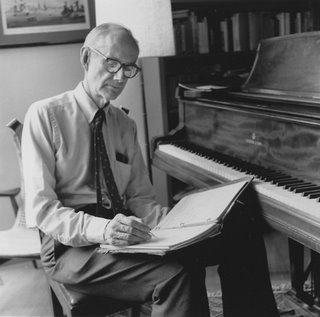 Dealing with the shock of the death of Karlheinz Stockhausen, whose Deutsche Grammophon LPs I reduced to dust by playing them incessantly on my pitiful portable picnic player, I somehow missed the fact that Andrew Imbrie had died, my last remaining composition teacher. I'm quite saddened by this. I met him through my first teacher, Robert Gross at Occidental, who had premiered his violin concerto back in 1958, just a few months after I was born, in the heady days of the space age. From the Time magazine review, entitled "New Star:"
Dealing with the shock of the death of Karlheinz Stockhausen, whose Deutsche Grammophon LPs I reduced to dust by playing them incessantly on my pitiful portable picnic player, I somehow missed the fact that Andrew Imbrie had died, my last remaining composition teacher. I'm quite saddened by this. I met him through my first teacher, Robert Gross at Occidental, who had premiered his violin concerto back in 1958, just a few months after I was born, in the heady days of the space age. From the Time magazine review, entitled "New Star:"Slim, tweedy Composer Imbrie worked intermittently on his concerto for four years, completed it in 1954. As performed last week by the San Francisco Symphony, with Robert Gross as violin soloist, it proved to be a propulsive, clamorous virtuoso work in both twelve-tone and traditional diatonic idioms, with its limber solo line woven through the big sonorities of the orchestra in a stirringly unfolding tapestry of sound. The first movement, in alternating slow and fast tempi, built to its main climax by echoing the solo violin nights with orchestral figurations set at closer and closer intervals. By turns, the second movement was complex and agitated, waltzlike and melodic, with muted violins and then muted trumpets repeating the soloist's refrainlike theme. The third movement opened with rich orchestral tone clusters, built to a brilliantly frenzied solo violin flight near the close. The 700 concertgoers called Conductor Enrique Jordá and Soloist Gross back for half a dozen bows, twice drew Imbrie from his seat in the audience.
Both of them were wonderful teachers, both masters of insight, not gurus pushing their package of answers to all questions, but mentors, able to peer into the mind of the student and guide them to a better version of their work. I remember a class with Professor Gross (yes, don't forget the 'Professor' - both of these men wore suits and ties every day) where he first helped me achieve a proper discordant cacophony and arrhythmic nonsimultaneity in a section of my setting of The Waste Land (have I burned that score yet?) and then immediately turned to help the next student achieve the ultimate in sentimental maudlin kitschiness by adding just the right bass note to his three-hanky oversugared stack of thirds. And all this even though he had accepted the serialist way and maybe even the dogma of its historical inevitability.
But dear Dr. Imbrie could do the same. At the time I met him - in late 1978 - I had reached my pinnacle of unlistenability: a concerto for contrabass playing in 8th tones accompanied by a trombone quartet in 6th tones and chorus singing slowed-down IPA transcriptions of the screams of the insane. He dug into the score, somehow sight-reading an approximation of it at the piano (which I had never even attempted), pointing out some structural imperfections along the way, noticing a bare fifth in the score (Heavens to Betsy!), talked to me - seriously - about who might be able to perform this unperformable piece and so on, never questioning why I would be wasting perfectly good staff paper on such a horrid odious slag heap of nonsense.
But I think that's what a real composition teacher should do, especially since the twentieth century destroyed any notion of right or wrongness or direction or mainstream or anything. We've all become pioneers in our own fable of the Wild West, especially those of us who actually live here on the left coast. To meet someone along the way who can read the signs and help us find our way - this is quite special. To have been attended by two such special people - well, this simply makes me embarrassed that I haven't done more with what they gave me.

